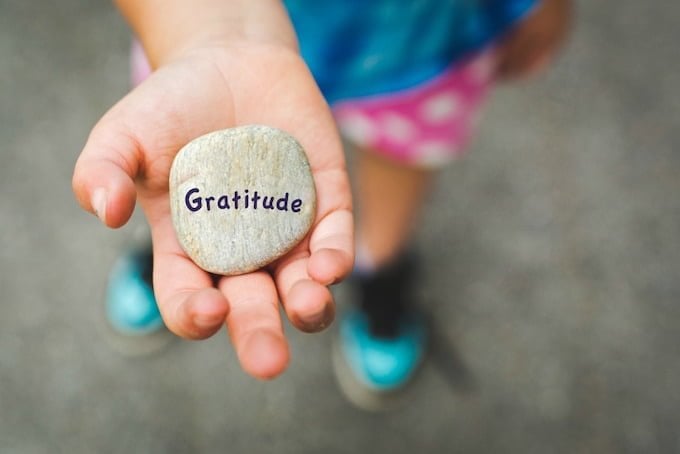5 Ways to Encourage an Attitude of Gratitude in Children
Helping kids develop an attitude of gratitude is a wonderful gift. Dr. Monisha Vasa is a psychiatrist, mother, narrative medicine scholar, and mindfulness practitioner, and she’s here to share her tips on encouraging kids to be more thankful.

“Gratitude unlocks the fullness of life. It turns what we have into enough, and more. It turns denial into acceptance, chaos to order, confusion to clarity. It can turn a meal into a feast, a house into a home, a stranger into a friend.” ~ Melody Beattie
Our adult brains know gratitude is important. When we’re in a state of gratitude – aware of our blessings, small and big, we feel happier and less alone.
We feel more connected to the people around us and to the life force greater than ourselves.
But our hearts can find it difficult to stay in a sustained place of gratitude. Rather, it is a practice of reminding ourselves over and over, to start, over and over. Sometimes it means keeping a gratitude journal. Sometimes that means taking a deep, conscious breath before we put our feet on the floor each morning.
5 Ways to Encourage an Attitude of Gratitude in Kids
What would happen if we introduced the concept of gratitude to our children when they are young?
If gratitude just became a part of their vocabulary, a daily habit like brushing their teeth or eating dinner? If they can experience the magic of gratitude early, perhaps the practice wouldn’t feel so challenging or foreign to them.
By parenting mindfully and modeling our own gratitude, children will naturally grow up noticing what’s important in life.
Start by cultivating your own gratitude practice
If we believe in the value of being thankful for all that we are blessed with, our vision starts to shift. We start to see the potential value or gift, even in difficult life experiences.
Children tend to follow what we do, even more than what we say. If our children see us connected and thankful, that energy will flow downstream toward them.
Verbalize gratitude as part of an everyday conversation
Say it out loud, “I really appreciate being able to watch you play in your soccer game.” Or, “We are so fortunate to share this meal together.” Making a point to express our thankfulness out loud can increase our joint awareness. The more we say it aloud, the more we feel it in our bones.
“Saying thank you to a child can be really powerful,” explains Patrick Coleman. “For one, if it’s said with sincerity and excitement, a child understands they’ve done something good, which reinforces their behavior. A ‘thanks’ also helps kids build a foundation of empathy by learning to recognize gratitude in others.” (Source)
Discover gratitude even for the small things
Children inherently are excited about both little and big things in life. Encourage gratitude for the simple, mundane parts of life, not just the exciting Disney World moments. As we adults know, much of life is a day in, day out, routine.
The trick is to see the beauty and wonder even in another day at work, or another morning of dropping the kids off to school. Sometimes, on difficult days, all we might be grateful for is another day on this Earth, or the beating of our heart. That is more than enough.
Encourage downtime for reflection
If we are moving at breakneck speed, it is hard to slow down enough to notice what there is to be grateful for. Noticing is the first step towards counting our blessings.
Encourage lots of time for quiet, rest, and reflection. A good time is the end of the day, perhaps before or after a night time story. Ask your children questions about the enjoyable and difficult parts of their day, the highs and the lows. This can encourage a dialogue about both gratitude, as well as the struggles they are currently experiencing.
Acknowledge the reality of your child’s emotional experience
Kids, just like adults, won’t feel grateful for everything, all the time. It is a practice for all of us. Sometimes, we need to feel through the anger and sorrow of an experience, before we can come to a place of gratitude. Otherwise, our gratitude becomes hollow or artificial.
Allow your children to feel what they feel, with adequate time and space. When the time feels right, see if there is an opportunity to include gratitude in the conversation.
Perhaps our practice of gratitude is one of the greatest gifts we can give to ourselves. We start to see all that is alive and breathing in our world, all of the collective energy and wisdom we are a part of. Whether we are grateful for our breath or another day, or whether we are grateful for a vacation or a yoga class, it is all important. We notice our life, and all of the details, and allow that noticing to sink into our lived experience.
If we can start this practice and conversation early, with our children, we build upon their young, resilient minds.
Gratitude becomes something we share with them, deepening our understanding of them, and deepening our connection to them. More than that, we can encourage skills that will last them a lifetime, enhancing their own sense of wellness in this world.
Guided Meditations for Gratitude
Another deeply meaningful way to encourage an attitude of gratitude in kids is to practice a meditation that focuses on being thankful. Here are two to get you started.
